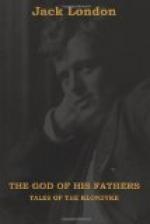Sigmund shook his head. “You can’t make me mad, Hitchcock, nor do mad things because of your madness. It’s a cold business proposition and a question of facts. I didn’t come to this country for my health, and, further, it’s impossible for us to raise a hand. If it is so, it is too bad for the girl, that’s all. It’s a way of her people, and it just happens we’re on the spot this one time. They’ve done the same for a thousand-thousand years, and they’re going to do it now, and they’ll go on doing it for all time to come. Besides, they’re not our kind. Nor’s the girl. No, I take my stand with Wertz and Hawes, and—”
But the dogs snarled and drew in, and he broke off, listening to the crunch-crunch of many snowshoes. Indian after Indian stalked into the firelight, tall and grim, fur-clad and silent, their shadows dancing grotesquely on the snow. One, the witch doctor, spoke gutturally to Sipsu. His face was daubed with savage paint blotches, and over his shoulders was drawn a wolfskin, the gleaming teeth and cruel snout surmounting his head. No other word was spoken. The prospectors held the peace. Sipsu arose and slipped into her snowshoes.
“Good-by, O my man,” she said to Hitchcock. But the man who had sat beside her on the sled gave no sign, nor lifted his head as they filed away into the white forest.
Unlike many men, his faculty of adaptation, while large, had never suggested the expediency of an alliance with the women of the Northland. His broad cosmopolitanism had never impelled toward covenanting in marriage with the daughters of the soil. If it had, his philosophy of life would not have stood between. But it simply had not. Sipsu? He had pleasured in camp-fire chats with her, not as a man who knew himself to be man and she woman, but as a man might with a child, and as a man of his make certainly would if for no other reason than to vary the tedium of a bleak existence. That was all. But there was a certain chivalric thrill of warm blood in him, despite his Yankee ancestry and New England upbringing, and he was so made that the commercial aspect of life often seemed meaningless and bore contradiction to his deeper impulses.
So he sat silent, with head bowed forward, an organic force, greater than himself, as great as his race, at work within him. Wertz and Hawes looked askance at him from time to time, a faint but perceptible trepidation in their manner. Sigmund also felt this. Hitchcock was strong, and his strength had been impressed upon them in the course of many an event in their precarious life. So they stood in a certain definite awe and curiosity as to what his conduct would be when he moved to action.
But his silence was long, and the fire nigh out, when Wertz stretched his arms and yawned, and thought he’d go to bed. Then Hitchcock stood up his full height.




